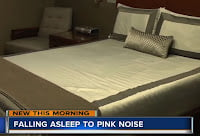SLEEP VIDEO & ARTICLE:
Sound stimulation in deep sleep improved memory for people with pre-dementia. The small pilot study used easy-to-get “pink noise” machines. See how this simple sleep therapy can make an important difference.
Northwestern scientists conducted a trial of sound stimulation overnight in people with pre-dementia, technically known as MCI (Mild Cognitive Impairment). Participants spent one night in the sleep laboratory and another night there about one week later. Each participant was tested using a sound machine that generated “pink noise“. They received sounds on one of the nights and no sounds on the other. The order of which night had sounds or no sounds was randomly assigned. Participants did memory testing the night before and again in the morning. Scientists then compared the difference in slow-wave sleep with sound stimulation and without sounds, and the change in memory across both nights for each participant.
The participants were tested on their recall of 44 word pairs. The individuals who had 20% or more increase in their slow wave activity after the sound stimulation recalled about two more words in the memory test the next morning. One person with a 40% increase in slow wave activity remembered nine more words.
The sound stimulation consisted of short pulses of pink noise, similar to white noise but deeper, during the slow waves. The system monitored the participant’s brain activity. When the person was asleep and slow brain waves were seen, the system delivered the sounds. If the patient woke up, the sounds stopped playing.
“As a potential treatment, this would be something people could do every night,” Malkani said.
Gentle, Stimulating Sound
Gentle sound stimulation played during specific times during deep sleep enhanced deep or slow-wave sleep for people with mild cognitive impairment, who are at risk for Alzheimer’s.
The individuals whose brains responded the most robustly to the sound stimulation showed an improved memory response the following day.
What is Pink Noise?
You might find it hard to focus when it’s too quiet. When it’s quiet, a single sound is accentuated, diverting your attention. White noise helps with that, creating a background that you don’t notice, but which also makes other noises less noticeable.
There are a few “colors” of these noises. What makes the difference are the sound frequencies involved. White noise has a higher frequency than pink noise. That’s why we perceive white noise to sound louder than it really is. The pink noise used in this study takes this into account and balances out the frequency. So when the frequency is higher, the volume is lowered. This seems to be more effective in sleep.
Sleep & Memory Loss
“Our findings suggest slow-wave or deep sleep is a viable and potentially important therapeutic target in people with mild cognitive impairment,” said Dr. Roneil Malkani, assistant professor of neurology at Northwestern University Feinberg School of Medicine and a Northwestern Medicine sleep medicine physician. “The results deepen our understanding of the importance of sleep in memory, even when there is memory loss.”
Deep sleep is critical for memory consolidation. Several sleep disturbances have been observed in people with mild cognitive impairment. The most pronounced changes include reduced amount of time spent in the deepest stage of sleep.
“There is a great need to identify new targets for treatment of mild cognitive impairment and Alzheimer’s disease,” Malkani added. Northwestern scientists had previously shown that sound stimulation improved memory in older adults.
Sleep, Sounds & Memory
Because the new study was small — nine participants — and some individuals responded more robustly than others, the improvement in memory was not considered statistically significant. However, there was a significant relationship between the enhancement of deep sleep by sound and memory: the greater the deep sleep enhancement, the better the memory response.
“These results suggest that improving sleep is a promising novel approach to stave off dementia,” Malkani said.
The paper is published in the Annals of Clinical and Translational Neurology.
The next step is to evaluate pink noise stimulation in a larger sample of people with mild cognitive impairment over multiple nights to confirm memory enhancement and see how long the effect lasts, Malkani said.




